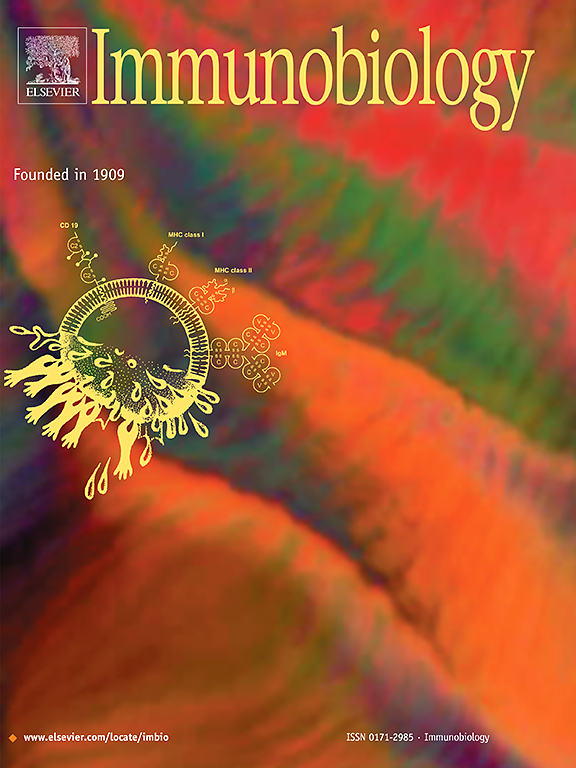TRIM59 alleviates acute respiratory distress syndrome by regulating inflammatory cytokines through RING domain
IF 2.3
4区 医学
Q3 IMMUNOLOGY
引用次数: 0
Abstract
Acute respiratory distress syndrome (ARDS) is characterized by significant morbidity and mortality. Particularly since the outbreak of COVID-19, the incidence and complexity of ARDS have been further highlighted. The etiology and pathogenesis of ARDS are multifactorial, involving complex interactions among genetic, environmental, and host factors. Further exploration of these factors is essential to enhance our understanding of ARDS and to develop more effective therapeutic strategies. Alveolar macrophages (AMs) are the first line of defense of innate immunity and are key to regulate the immune system, and are closely related to cytokine storm in ARDS. Therefore, macrophages are an important part to alleviate ARDS. TRIM59 is a molecule expressed on macrophages. Our previous studies have shown that TRIM59 was capable of modulating macrophage function. However, the role of TRIM59 in the pathogenesis and progression of ARDS remains to be elucidated. In this study, we established an animal model of ARDS using mice in which TRIM59 was specifically knocked out in bone marrow-derived macrophages (BMDMs). Our results confirmed that TRIM59 exerted a protective effect against ARDS in vivo via its regulation on macrophages. Mechanistic investigations revealed that TRIM59 inhibited the activation of the nuclear factor-κB (NF-κB) signaling pathway through its RING domain. In summary, the present findings indicate that TRIM59 may serve as a crucial regulatory molecule in the ARDS, potentially offering a novel therapeutic target for its alleviation.
TRIM59通过RING结构域调节炎症因子,缓解急性呼吸窘迫综合征
急性呼吸窘迫综合征(ARDS)具有显著的发病率和死亡率。特别是自2019冠状病毒病暴发以来,ARDS的发病率和复杂性进一步凸显。ARDS的病因和发病机制是多因素的,涉及遗传、环境和宿主因素之间复杂的相互作用。进一步探索这些因素对于提高我们对ARDS的认识和制定更有效的治疗策略至关重要。肺泡巨噬细胞(Alveolar macrophages, AMs)是先天免疫的第一道防线,是调节免疫系统的关键,与ARDS的细胞因子风暴密切相关。因此,巨噬细胞是缓解ARDS的重要组成部分。TRIM59是巨噬细胞上表达的一种分子。我们之前的研究表明TRIM59能够调节巨噬细胞的功能。然而,TRIM59在ARDS发病和进展中的作用仍有待阐明。在本研究中,我们利用骨髓源性巨噬细胞(bmdm)特异性敲除TRIM59的小鼠建立了ARDS动物模型。我们的研究结果证实TRIM59通过调节巨噬细胞在体内对ARDS具有保护作用。机制研究表明,TRIM59通过其RING结构域抑制核因子-κB (NF-κB)信号通路的激活。综上所述,目前的研究结果表明TRIM59可能是ARDS的关键调控分子,可能为缓解其提供新的治疗靶点。
本文章由计算机程序翻译,如有差异,请以英文原文为准。
求助全文
约1分钟内获得全文
求助全文
来源期刊

Immunobiology
医学-免疫学
CiteScore
5.00
自引率
3.60%
发文量
108
审稿时长
55 days
期刊介绍:
Immunobiology is a peer-reviewed journal that publishes highly innovative research approaches for a wide range of immunological subjects, including
• Innate Immunity,
• Adaptive Immunity,
• Complement Biology,
• Macrophage and Dendritic Cell Biology,
• Parasite Immunology,
• Tumour Immunology,
• Clinical Immunology,
• Immunogenetics,
• Immunotherapy and
• Immunopathology of infectious, allergic and autoimmune disease.
 求助内容:
求助内容: 应助结果提醒方式:
应助结果提醒方式:


